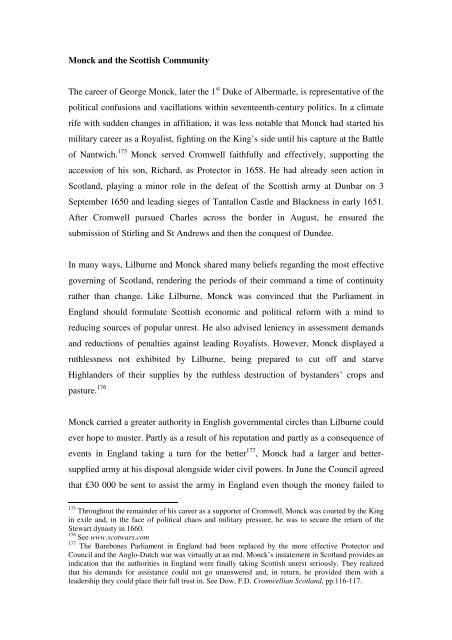The Glencairn Uprising, 1653-54 Helen Baker Department of ...
The Glencairn Uprising, 1653-54 Helen Baker Department of ...
The Glencairn Uprising, 1653-54 Helen Baker Department of ...
Create successful ePaper yourself
Turn your PDF publications into a flip-book with our unique Google optimized e-Paper software.
Monck and the Scottish Community<br />
<strong>The</strong> career <strong>of</strong> George Monck, later the 1 st Duke <strong>of</strong> Albermarle, is representative <strong>of</strong> the<br />
political confusions and vacillations within seventeenth-century politics. In a climate<br />
rife with sudden changes in affiliation, it was less notable that Monck had started his<br />
military career as a Royalist, fighting on the King’s side until his capture at the Battle<br />
<strong>of</strong> Nantwich. 175 Monck served Cromwell faithfully and effectively, supporting the<br />
accession <strong>of</strong> his son, Richard, as Protector in 1658. He had already seen action in<br />
Scotland, playing a minor role in the defeat <strong>of</strong> the Scottish army at Dunbar on 3<br />
September 1650 and leading sieges <strong>of</strong> Tantallon Castle and Blackness in early 1651.<br />
After Cromwell pursued Charles across the border in August, he ensured the<br />
submission <strong>of</strong> Stirling and St Andrews and then the conquest <strong>of</strong> Dundee.<br />
In many ways, Lilburne and Monck shared many beliefs regarding the most effective<br />
governing <strong>of</strong> Scotland, rendering the periods <strong>of</strong> their command a time <strong>of</strong> continuity<br />
rather than change. Like Lilburne, Monck was convinced that the Parliament in<br />
England should formulate Scottish economic and political reform with a mind to<br />
reducing sources <strong>of</strong> popular unrest. He also advised leniency in assessment demands<br />
and reductions <strong>of</strong> penalties against leading Royalists. However, Monck displayed a<br />
ruthlessness not exhibited by Lilburne, being prepared to cut <strong>of</strong>f and starve<br />
Highlanders <strong>of</strong> their supplies by the ruthless destruction <strong>of</strong> bystanders’ crops and<br />
pasture. 176<br />
Monck carried a greater authority in English governmental circles than Lilburne could<br />
ever hope to muster. Partly as a result <strong>of</strong> his reputation and partly as a consequence <strong>of</strong><br />
events in England taking a turn for the better 177 , Monck had a larger and bettersupplied<br />
army at his disposal alongside wider civil powers. In June the Council agreed<br />
that £30 000 be sent to assist the army in England even though the money failed to<br />
175 Throughout the remainder <strong>of</strong> his career as a supporter <strong>of</strong> Cromwell, Monck was courted by the King<br />
in exile and, in the face <strong>of</strong> political chaos and military pressure, he was to secure the return <strong>of</strong> the<br />
Stewart dynasty in 1660.<br />
176 See www.scotwars.com<br />
177 <strong>The</strong> Barebones Parliament in England had been replaced by the more effective Protector and<br />
Council and the Anglo-Dutch war was virtually at an end. Monck’s instatement in Scotland provides an<br />
indication that the authorities in England were finally taking Scottish unrest seriously. <strong>The</strong>y realized<br />
that his demands for assistance could not go unanswered and, in return, he provided them with a<br />
leadership they could place their full trust in. See Dow, F.D. Cromwellian Scotland, pp.116-117.
















